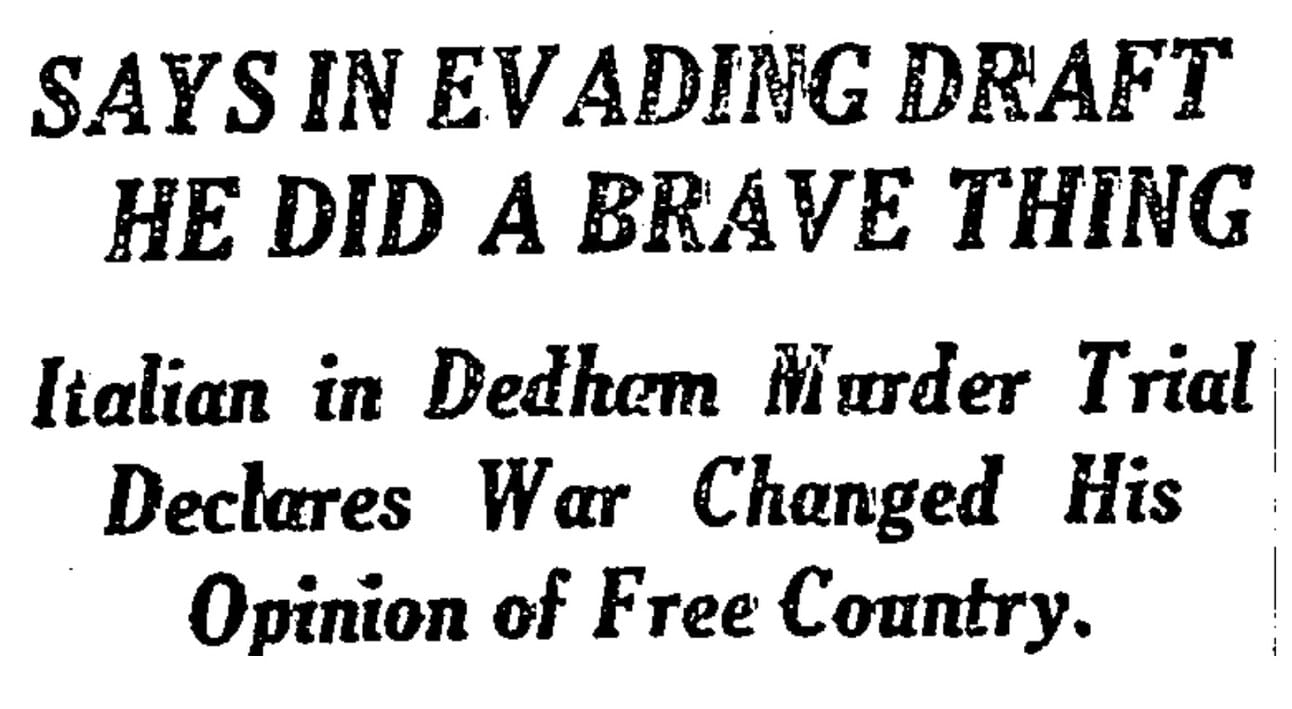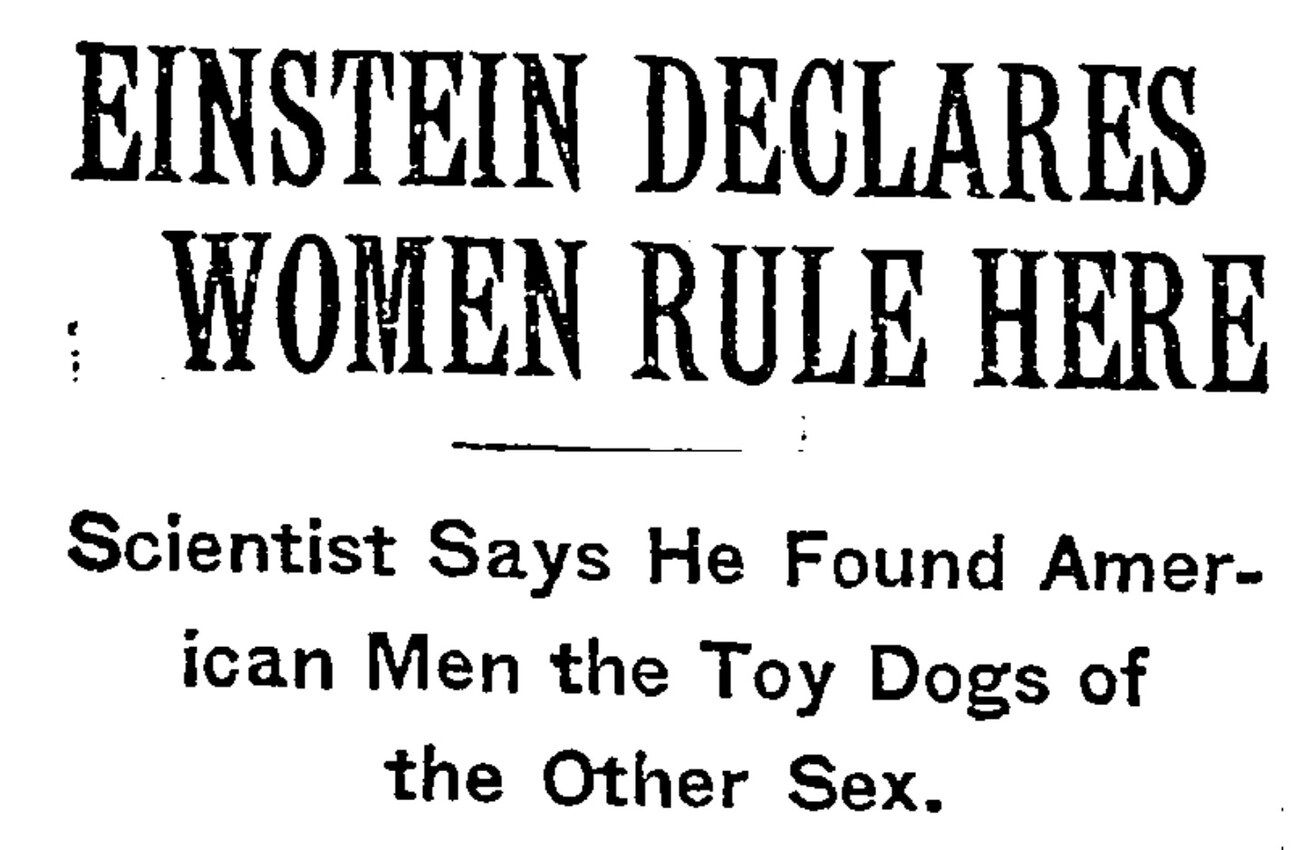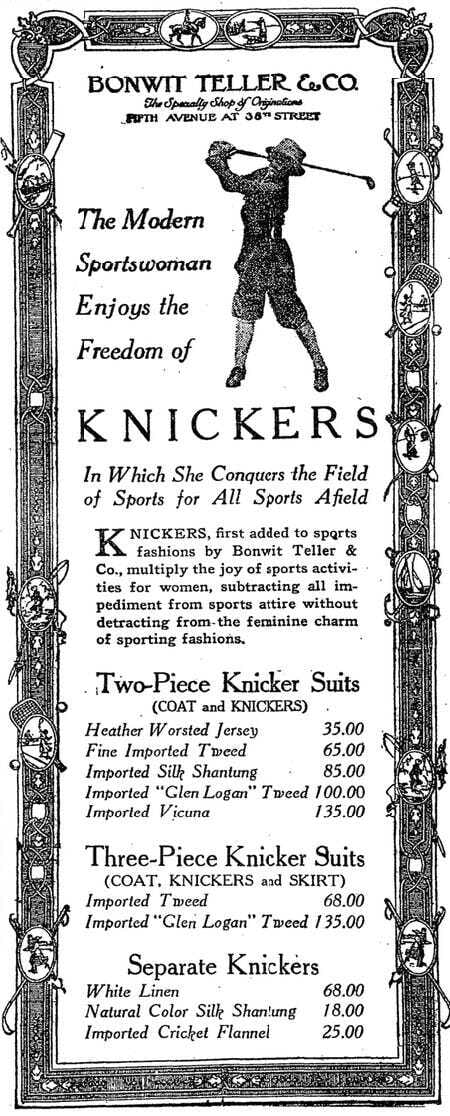- Strange Times
- Posts
- Strange Times 189: Einstein Declares Women Rule
Strange Times 189: Einstein Declares Women Rule
Today in Podcasts, Henry and I take a look at the recent Best Picture winner Parasite, and try to figure out why it leaves us cold. Listen on Apple Podcasts, Spotify, or elsewhere. Whether or not you’ve listened to the podcast yet, I’d love to hear your thoughts on Parasite. Did you like it? Did you love it? Was it the kind of thing you’d like to watch a second time? Comment and let me know!

Today we have Europeans who don’t care for America and an American who adores European brocade. Impersonate a Vanderlip on…
July 8, 1921
In Ashtabula, a woman working at a bank responds to a revolver pointed in her face by stepping on the bank alarm, whose sound frightens the robbers into fleeing.
Charles, the deposed Austro-Hungarian emperor—and controversial saint!—renews his lease on his home in Switzerland after England, Spain and Greece all refuse to give him refuge.
In the trial of Mrs. Kaber for the murder of her husband, policemen testify that as he died, Mr. Kaber exclaimed, “My wife ordered this done. My God, my wife ordered this done.”
The Weather: Partly cloudy today and tomorrow; possible thunder showers tomorrow.

This is the first appearance in the newsletter, I believe, of doomed anarchists Sacco and Vanzetti, who would be much more famous by the time of their deaths in 1927 than they were during their trial. It’s insane to think that draft dodging would be considered relevant to the murder of a payroll paymaster and guard—it suggests that either the Judge was prejudiced against the anarchists, their attorneys were incompetent, or both. In either case, it is a good opportunity to listen to Joan Baez’s song about the unfortunate Nico and Bart.
DEDHAM, Mass., July 7.—The flight of Niccola Sacco and Bartolomeo Vanzetti to Mexico, with five other men, to avoid the military draft of 1917, was a subject of further testimony today, when Sacco went under cross-examination at the trial of himself and Vanzetti for the murder of a South Braintree paymaster and his guard.
The District Attorney asked why he did not stay in Mexico, and Sacco replied that he couldn’t get work at his trade there and did not like the food or the manner of living.
When the District Attorney asked what he meant when he said that he loved a free country, Sacco made a ten-minute speech. He had come to this country, he said, and found it was not what he thought it.
He thought men were free in their ideas here, but he said he had seen some of the best men in this country sent to prison. He “saw one man dead because he was a Socialist,” he added, explaining that “this man was put in prison because the capitalist class was against him.”
Sacco said he did not believe in any more wars for killing young men so that when the time came for a father to get some profit out of a son capitalists could send him to a war, which was for the business of millionaires and not the country.
He was uninterrupted during this speech, which he finished by saying: “That is why my ideas changed about this country, which I thought at one time was a free country.”
Sacco said that at the time of his arrest and for a short time before that he was afraid he might be deported from the United States because of his radical views. He had in his home about three dozen anarchistic books and other anarchistic literature, he said. He would not destroy the books, he said, because he loved them.

I have nothing intelligent to say about the theory of relativity but I can certainly confirm Einstein’s latest assertion: American men are useless and the nation is, as a whole, bored.
BERLIN, July 7.—Dr. Albert Einstein, the famous scientist, made an amazing discovery relative to America on his trip which he recently explained to a sympathetic-looking Hollander as follows:
“The excessive enthusiasm for me in America appears to be typically American. And if I grasp it correctly the reason is that the people in America are so colossally bored, very much more than is the case with us. After all, there is so little for them there!” he exclaimed.
Dr. Einstein said this with vibrant sympathy. He continued:
“New York, Boston, Chicago and other cities have their theatres and concerts, but for the rest? There are cities with 1,000,000 inhabitants, despite which what poverty, intellectual poverty! The people are, therefore, glad when something is given them with which they can play and over which they can enthuse. And that they do, then, with monstrous intensity.
“Above all things are the women who, as a literal fact, dominate the entire life in America. The men take an interest in absolutely nothing at all. They work and work, the like of which I have never seen anywhere yet. For the rest they are the toy dogs of the women, who spend the money in a most unmeasurable, illimitable way and wrap themselves in a fog of extravagance. They do everything which is the vogue and now quite by chance they have thrown themselves on the Einstein fashion.
“You ask whether it makes a ludicrous impression on me to observe the excitement of the crowd for my teaching and my theory, of which it, after all, understands nothing? I find it funny and at the same time interesting to observe this game.
“I believe quite positively that it is the mysteriousness of what they cannot conceive which places them under a magic spell. One tells them of something big which will influence all future life, of a theory which only a small group, highly learned, can comprehend. Big names are mentioned of men who have made discoveries, of which the crowd grasps nothing. But it impresses them, takes on color and the magic power of mystery, and thus one becomes enthusiastic and excited.
“My impressions of scientific life in America? Well, I met with great interest several extraordinarily meritorious professors, like Professor Milliken. I unfortunately missed Professor Michelson in Chicago, but to compare the general scientific life in America with Europe is nonsense.”

Who is this Ripley, charming maids out of $10 bills and impersonating a banker’s nephew so that he can steal antique brocade? I fear we shall never know.
A young man of taking ways, who apparently desires to furnish an apartment with costly rugs and hangings, has been masquerading as a nephew of Frank A. Vanderlip, formerly president of the National City Bank. Paul Thedore Frankl, a dealer in antique furnishings at 4 East Forty-eighth Street, told the police yesterday that “Vanderlip” had obtained a brocade from him valued at $1,050 and disappeared.
The people with whom “Vanderlip” boarded at 14 East Sixty-first Street, and to whom he was known as “Vanderlyn,” still believe him to be one of the most charming young men they ever knew and are positive that he will come back and explain all. Mrs. Grace Thompson, who owns the house, said he was being done a great injustice, and a maid, from whom he borrowed $10 when his checkbook on a San Diego bank was lost, said that Vanderlyn was “a nice young man,” greatly misunderstood.
Mr. Vanderlip, the banker, said last night that he had no nephew of his own name and never heard of the man until yesterday morning, when Mr. Frankl called up and asked about the supposed nephew. The young man also casually mentioned that he was a cousin of Washington B. Vanderlip, who came back from Russia with a story of concessions granted by the Soviet government. Mr. Vanderlip, the banker, is not related to the other Mr. Vanderlip.
The man with a liking for brocades dropped into Mr. Frankl’s place about ten days ago.
“I’m really tired of my red brocaded Italian hangings,” he said. “I thought I might get something that looks a little cooler in this weather.”
The young man noticed some sixteenth century tassels and admired them, but did not buy. Then Mr. Frankl called him up and his customer returned a second time, when he mentioned a carved Italian chest in the Metropolitan Museum of Art, and said that he would like to have Mr. Frankl duplicate it for him. He remarked that he was a member of the Museum Association and would Mr. Frankl run up with him in his car the next day and look at it? Mr. Frankl would. Then “Vanderlip” caught sight of a brocade which had hung in Emperor Franz Josef’s palace, and went into raptures over it. “Vanderlip” mentioned that his aunt was coming to visit him at 2 o’clock, and he would like to have Mr. Frankl come up at 4 o’clock and advise him about the decoration of it. He wished his aunt could see the brocade, and without hesitation Mr. Frankl begged him to take it along. After some hesitation “Vanderlip” did so.
When 4 o’clock approached Mr. Frankl called up the East Sixty-fifth Street house, and was told that “Vanderlip” was not in. He also was told for the first time that his customer’s name was “Vanderlyn.” He called again at 5:30 and “Vanderlyn” still was out.
Frances Quinn, the maid, was certain last night that “Vanderlyn” was coming back. On Sunday he told her that he had lost his checkbook on a bank where he had $3,000, and that he had telegraphed to stop payment on the checks. He asked if she had any money, and when she found $10 in her pocketbook he took it.


